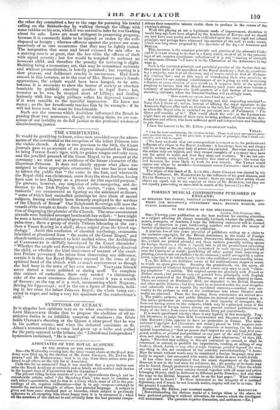FOREIGN MUSICAL COMPOSITIONS PUBLISHED IN ENGLAND;
AS REGARDS THE PUBLIC, FOREIGN AUTHORS, NATIVE PROFESSORS, COPY- RIGHT (OR MONOPOLY), STATIONERS' HALL, BRITISH MUSEUM, AND PUBLIC LIBRARIES.
TO TILE EDITOR OF THE SPECTATOR.
London, 12th February 1841.
SIR—Viewing your publication as the best medium for exciting attention to a subject affecting all classes musically inclined, whether the public, com- posers, arrangers, or teachers, I hope the following statement will be deemed worthy of insertion in your forthcoming number, and prove the means of further elucidation and exposition, or refutation. A practice has of late years prevailed of publishers setting up a claim to the exclusive copyright, for the British dominions, in the works of Foreign composers, such RS AUBEB, BELLISI, DONIZETTI, MERCADANTE, ROSSINI, &c., (which are printed abroad,) and these authors generally writing operas for foreign theatres, a claim is equally laid to all the productions emanating from or founded upon the subjects, (contained in such operas,) published all over the Continent or world ; prohibiting all other parties from importing or printing, (eventhough not published by the claimant,) and if arranged by a native artist, rejecting it or taking it only on his (the publisher's) own exacting terms. You, Mr. Editor, are doubtless aware of the multitudinous shapes in music to which an opera gives rise. Securing the groundwork, viz. the opera, all arrangements of whatever description are of course only open to such "claim- ing proprietor" to publish. The original operas are generally with French or Italian words ; but portions only are printed here, principally with English words, as produced at the English Theatres, or new words adapted to them. These are entered at Stationers' Hall, are deposited in the British Museum and other public libraries ; but they must be so entered under the most deceptive and colourable titles as regards the mutilated contents,—conduct very un- worthy to the authors as well as the institutions into whose libraries such works are admitted. From the foregoing, these conclusions are arrived at- 1. The public, authors, and public libraries are injured and imposed upon ; 2. The native profession are circumscribed in their capacity. of arrangers, &c., from not having access to the subjects, which may be a principal cause of the preponderance of foreign names among our present musical publications; so many of the latter, from cause before named, being got gratuitously.
i
It is much questioned whether there is any legality in this monopoly. Eng- lish literature, to judge from MM. GALIGNANI'S and &ASKS and X.AVIER s (late BAUDRT) lists, appears to have no protection in France. The inter- national Copyright Act (literature and music) passed in 1838 requires reci- procity; and former acts contain the expression or meaning, (in the clause against importation,) "that no person shall import for sale any book first com- posed, written, or printed and published in any part of the said United King- dom, and reprinted in any other country or place whatsoever," 41 Gee. ILL Again, "Provided that nothing in this act contained do extend, or shall be construed to extend, to prohibit the importation, vending, or selling, of any books in Greek, Latin, or any ether foreign language printed beyond the seas, any thing in this act contained to the contrary notwithstanding," 8 Anne. How far music without words may be considered a foreign language, may pro- bably be argued; but connected with words, the latter at once would decide.
It has often been complained that the music department of the British Museum is not in the best state for reference, &c.; the quality of its books may also be feared, though protected by enactment, (54 Geo. III.,) "that the whole of every book and of every volume thereof, together with all maps and prints belonging thereto, shall be delivered to different public libraries ; and also that the copy to the British Museum shall be on the best paper." What editions may not now be found ? To those interested in the integrity of a national depository, and if music be not beneath notice, inquiry will not be in vain. For the present I conclude, Remaining, Mr. Editor, your constant reader, AREOTICUS. [Notwithstanding the obvious marks of a foreign idiom in the above, we have preferred printing it without alteration, for reasons which the intelligent will understand. The question requires discussion, and settlement.—ED.]


























 Previous page
Previous page